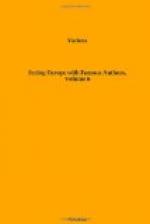Earth has no scenes of placid fruitfulness more balmy than the banks of one of the larger lakes, crowded with vineyards, orchards, groves and pastures, down to the edge of its watery mirror, wherein, beside a semi-tropical vegetation, we see the image of some medieval castle, of some historic tower, and thence the eye strays up to sunless gorges, swept with avalanches, and steaming with feathery cascades; and higher yet one sees against the skyline ranges of terrific crags, girt with glaciers, and so often wreathed in storm clouds.
All that Earth has of most sweet, softest, easiest, most suggestive of langor and love, of fertility and abundance—here is seen in one vision beside all that Nature has most hard, most cruel, most unkind to Man—where life is one long weary battle with a frost bitten soil, and every peasant’s hut has been built up stone by stone, and log by log, with sweat and groans, and wrecked hopes. In a few hours one may pass from an enchanted garden, where every sense is satiated, and every flower and leaf and gleam of light is intoxication, up into a wilderness of difficult crags and yawning glaciers, which men can reach only by hard-earned skill, tough muscle and iron nerves....
The Alps are international, European, Humanitarian. Four written languages are spoken in their valleys, and ten times as many local dialects. The Alps are not especially Swiss—I used to think they were English—they belong equally to four nations of Europe; they are the sanatorium and the diversorium of the civilized world, the refuge, the asylum, the second home of men and women famous throughout the centuries for arts, literature, thought, religion. The poet, the philosopher, the dreamer, the patriot, the exile, the bereaved, the reformer, the prophet, the hero—have all found in the Alps a haven of rest, a new home where the wicked cease from troubling, where men need neither fear nor suffer. The happy and the thoughtless, the thinker and the sick—are alike at home here. The patriot exile inscribed on his house on Lake Leman—“Every land is fatherland to the brave man.” What he might have written is—“This land is fatherland to all men.” To young and old, to strong and weak, to wise and foolish alike, the Alps are a second fatherland.
INTERLAKEN AND THE JUNGFRAU[30]
B.T. ARCHIBALD CAMPBELL KNOWLES
It is hard to find a prettier spot than Interlaken. Situated between two lovely lakes, surrounded by wooded heights, and lying but a few miles from the snowy Jungfrau, it is like a jewel richly set. From Lucerne over the Brunig, from Meiringen over the Grimsel come the travelers, passing on their way the Lake of Brienz, with the waterfall of the Giessbach, on its southern side.




